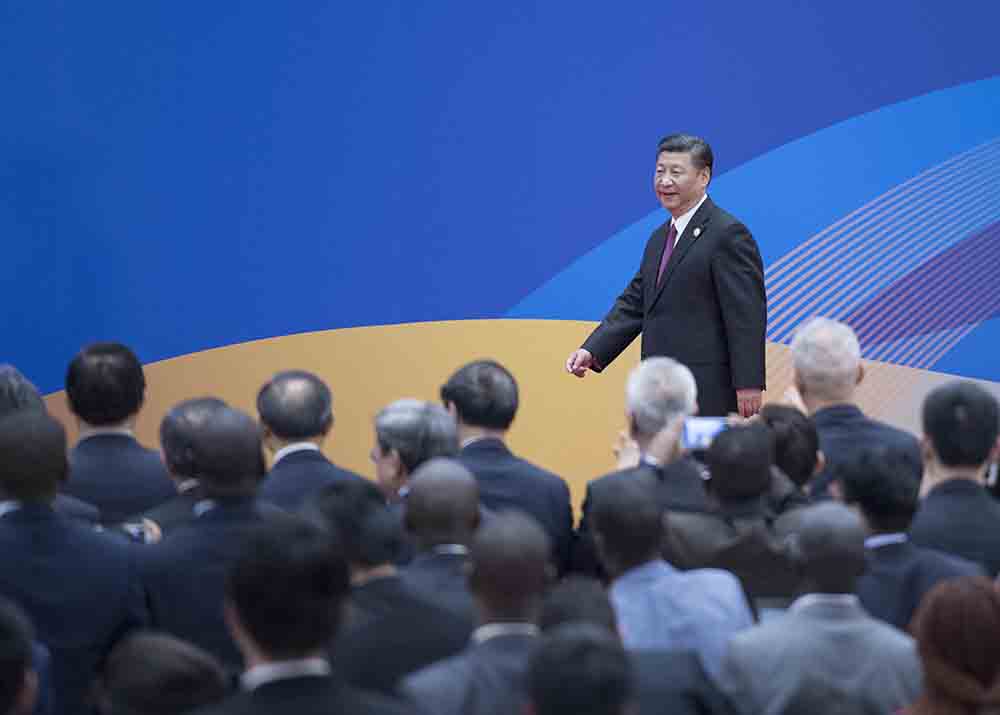Media Report

- The Washington Post reports: "Chinese President Xi Jinping expressed ambitious hopes for Asian and European governments to work more closely on finance, law enforcement and a broad range of other issues as leaders from 30 nations issued a joint endorsement Monday of a Beijing-led trade initiative. The 'Belt and Road' project is China's biggest foreign initiative to date as Beijing looks for global stature to match its economic success. It calls for expanding trade across Asia, Africa and Europe with multibillion-dollar investments in ports, railways and other facilities, but governments including Russia, Washington and India are uneasy Beijing also is using it to gain political influence. Xi said the project has 'no political agenda.' But he expressed hope governments taking part in the initiative will coordinate policy in finance, law enforcement, technology and education — areas where China's status as the biggest Asian economy would allow Beijing to dominate. 'It is our hope that through the 'Belt and Road' development, we will unleash new forces for global economic growth,' Xi told reporters at a conference center in the hills north of the Chinese capital."
- Reuters reports: "The WannaCry 'ransomware' cyber attack hobbled Chinese traffic police and schools on Monday as it rolled into Asia for the new work week, while authorities in Europe said they were trying to prevent hackers from spreading new versions of the virus...Shares in firms that provide cyber security services rose with the prospect that companies and governments would have to spend more money on defenses. Some victims were ignoring official advice and paying the $300 ransom demanded by the cyber criminals to unlock their computers, which was due to double to $600 on Monday for computers hit by Friday's first wave...Although the virus's spread was curbed over the weekend in most of the world, France, where carmaker Renault was among the world's highest profile victims, said more attacks were likely. 'We should expect similar attacks regularly in the coming days and weeks,' said Giullaume Poupard, head of French government cyber security agency ANSSI. 'Attackers update their software ... other attackers will learn from the method and will carry out attacks.' Companies and governments spent the weekend upgrading software to limit the spread of the virus. Monday was the first big test for Asia, where offices had already mostly been closed for the weekend before the attack first arrived."
- The Diplomat comments: "On Monday evening, the curtain closed on China's massive Belt and Road Forum (BRF) in Beijing. The two-day summit was attended by 30 world leaders (including Chinese President Xi Jinping, who delivered both the opening and closing remarks) and official government representatives from at least 30 more countries. It served as a diplomatic showcase for China's ambitious global project, which aims to create an interlocked trade, financial, and culture network stretching from East Asia to Europe and beyond...In his keynote address at the BRF's opening ceremony, Xi likewise highlighted the achievements of the initiative so far in a series of bilateral examples. In the three-plus years since rolling out the concept, China has successfully 'deepened policy connectivity' with a number of other states and groupings, Xi said.. 'We have accelerated the building of Jakarta-Bandung high-speed railway, China-Laos railway, Addis Ababa-Djibouti railway, and Hungary-Serbia railway, and upgraded Gwadar and Piraeus ports in cooperation with relevant countries.' Notably, the first two projects on that list have run into a number of issues in implementation...According to Xi, 'Total trade between China and other Belt and Road countries in 2014-2016 has exceeded $3 trillion, and China's investment in these countries has surpassed $50 billion.' Those figures were boosted by the creation of financing mechanisms specifically to carry out the Belt and Road vision, including the multilateral Asian Infrastructure Investment Bank (AIIB) and China's Silk Road Fund."
Calendar
- 2017-05-14 Xi Jinping Positions China at Center of New Economic Order
- 2017-05-12 U.S. announces trade progress with China in 10 key areas
- 2017-05-11 South Korea’s New President Moves to Soothe Tensions With China
- 2017-05-10 S. Korea’s leader willing to visit North, talk to US, China
- 2017-05-09 Senate Panel Approves Trump's Pick for US Envoy to China
- 2017-05-08 Trump Looms as Kushner Companies Courts Investors in China
- 2017-05-07 Taiwan arms deal in limbo as Trump courts China
- 2017-05-05 With maiden jet flight, China enters dog-fight with Boeing, Airbus
- 2017-05-04 China encircles the world with One Belt, One Road strategy
- 2017-05-03 Trump’s Turn Toward China Curtails Navy Patrols in Disputed Zones
News
- The Washington Post China's Xi outlines plans for wide cooperation in trade plan
- Reuters China hit by cyber virus, Europe warns of more attacks
- The Wall Street Journal China's President Xi Casts Country as Guardian of Globalization
- The New York Times U.S. Firms Want In on China's Global 'One Belt, One Road' Spending
- Reuters China, Vietnam agree to keep South China Sea tensions in check
- BBC AirAsia to launch China joint venture
- The Financial Times China growth headed lower as commodity rout hits factories
- Bloomberg China Central Bank Turning to Big Data for Financial Supervision
- The Guardian Qingdao in the spotlight: Hollywood descends on China's east coast city
- The New York Times Cyberattack Spreads in Asia, Though No 'Second Wave' Is Seen
- The Washington Post Chinese textile firm hiring up to 800 in east Arkansas
- Bloomberg Asian Stocks Rise as China's Spending Plans Overshadow Data
- The Financial Times Kenya president urges rebalance of China-Africa trade
Commentary
- The Diplomat What Did China Accomplish at the Belt and Road Forum?
- Fortune A Most Important Company
- Forbes Trump's Trade Deal 'Win' With China: Fake News?
- The Diplomat On the Chinese Campaign Trail: The Path to the 19th Party Congress
- The National Interest Why China Will Never Put America First
- Barron's China, Hong Kong Stocks: 3 Things To Watch
- Business Insider China's industrial production slows down
